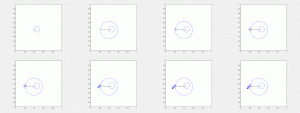The ocean circulation is fantastically complicated, with eddies at the centimeter scale all the way to the global scale, with giant overturning cells that connect the Atlantic and Indo-Pacific basins. It transports vast amounts of heat, carbon, nutrients, and oxygen, thus sustaining life in the ocean and maintaining the climate of the earth. Dynamically, the circulation is controlled by large-scale buoyancy gradients, small scale mixing processes, and baroclinically unstable wind-driven gyres and the Antarctic circumpolar current.
The representation of these currents in numerical ocean models presents a formidable challenge. Our research group combines satellite, ship, and drifter-based observations with numerical ocean models to estimate the climatological circulation of the ocean. Our focus is on applying Bayesian methods to obtain a joint physical and biogeochemical state estimate. Research team members develop and apply numerical ocean models, diagnostic methods, and computational techniques. Important developments include:
- Global biogeochemical inverse models to estimate N:P:C:-O2 ratio of organic matter.
- A global biogeochemical inverse model for the marine nitrogen cycle.
- A global biogeochemical inverse model for the biological carbon pump constrained by multiple decades of hydrographic observations, including dissolved oxygen, dissolved inorganic carbon, alkalinity, phosphate, dissolved organic carbon, and carbon isotopes.

- Sparse-matrix tracer transport operators to accelerate the spin-up of ocean tracers in global models.
- Preconditioned Newton-Krylov solvers for the cyclo-stationary annual cycle of ocean tracers.
- The data-constrained Ocean Circulation Inverse Model (OCIM).
Cool gif from my ESS 212 course.
zot zot zot
